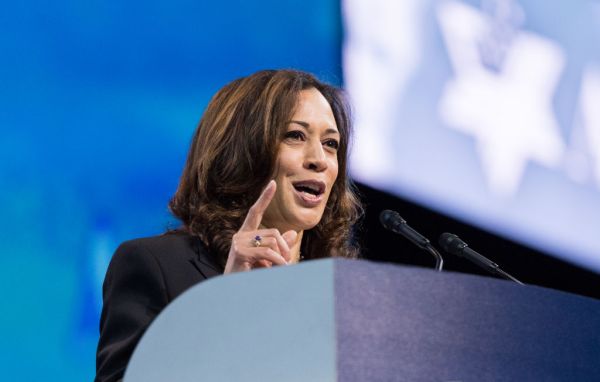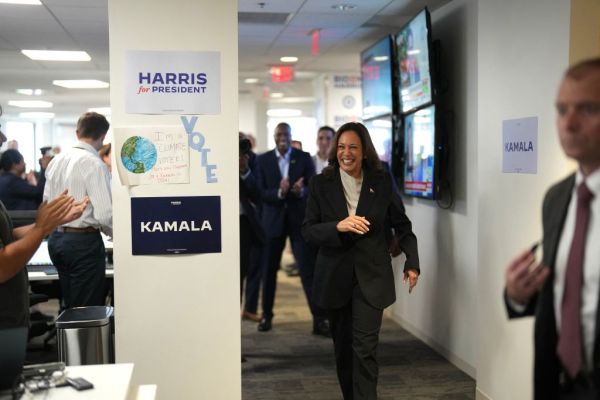Congressional Republicans are adding another entry to their ongoing list of Hunter Biden investigations: his burgeoning interest in art. Last week, Business Insider published a report alleging that Hunter Biden knew the identity of at least two individuals who purchased his paintings—a claim that, if true, violates the White House’s 2021 pledge that the president’s son wouldn’t have access to information about his buyers.
Further complicating matters, one of the alleged buyers, Elizabeth Hirsh Naftali, was appointed last year by President Joe Biden to a government commission working to preserve European historical sites.
The situation has drawn “pay-to-play” accusations, and Arkansas Sen. Tom Cotton referred to the art sales as “bribes for the Biden family, approved by the president.” On Saturday, the House Oversight Committee demanded to see documents related to the sales.
When did Hunter Biden become an artist?
Hunter Biden told the New York Times in 2020 that he lacks any formal art training. His first art show was in 2021, less than a year after his father’s inauguration. Despite his inexperience, Biden’s paintings have sold for tens of thousands of dollars, drawing concerns over potential conflicts of interest and criticism from skeptics who say the president’s son is profiting off of his father’s name.
What do we know about Hunter Biden’s art sales?
According to gallery documents obtained by Business Insider, Hunter Biden’s artwork has sold for at least $1.3 million. Hirsh Naftali purchased Hunter Biden’s art, and the president’s son was aware of the sale, three anonymous sources told Business Insider—an allegation confirmed by Hunter Biden’s attorney.
In July 2022, President Biden appointed Hirsh Naftali to the Commission for the Preservation of America’s Heritage Abroad, a government agency dedicated to protecting “endangered historic sites in Eastern and Central Europe that are associated with the heritage of U.S. citizens.” The president appoints the commission’s 21 unpaid members. Seven are appointed in consultation with the speaker of the House—former Speaker Nancy Pelosi advised President Biden on Hirsh Naftali’s appointment, according to Business Insider—and seven with the president pro tempore of the Senate.
Hirsh Naftali’s bio on the commission’s website describes her as the owner of a Los Angeles commercial real estate company, a board member of both the Los Angeles-based Jewish community IKAR and the RAND Corporation Center for Middle East Public Policy, and a philanthropist active in Israel. This year, she has donated almost $37,000 to the Democratic National Committee, according to the Federal Election Commission. Additionally, she donated more than $13,000 to Joe Biden’s presidential campaign, Business Insider reported.
Hunter Biden was also aware of the identity of a second buyer, Business Insider alleges—Kevin Morris, a lawyer and personal friend who has given significant sums of money to both the president’s son and the Democratic Party.
What do we not know?
Biden critics say this is evidence of a pay-to-play scheme—give the Bidens money in exchange for government access or power—but it’s not clear whether Hirsh Naftali bought Hunter Biden’s art before or after she was appointed to the commission last year. Nor is there any evidence of Hunter Biden speaking to his father about her appointment.
Business Insider’s sources for the allegation that Hunter Biden knew who the two buyers are anonymous, and the publication describes them only as three people “directly familiar with his own account of his art career.”
When asked last week if she would take questions on “corruption concerns about art sales,” White House Press Secretary Karine Jean-Pierre walked away without answering.
What are the ethical problems?
In an effort to prevent individuals from attempting to gain favor with the White House by purchasing the president’s son’s paintings, the White House helped establish a system that would allow Hunter Biden to sell his paintings through a gallery in New York City without knowing who bought them or how much money they sold for. It’s “challenging for an anonymous person who we don’t know and Hunter Biden doesn’t know to have influence” in the administration, former White House Press Secretary Jen Psaki said at a July 2021 press briefing.
But some critics argue that secrecy actually contributes to the problem. It’s “exactly the wrong approach,” Danielle Brian, executive director and president of the Project on Government Oversight, tells The Dispatch. “We thought that it needed to be completely transparent who is buying the art, and being able to see that there is no connection between the art purchasers and the president’s official activities.”
Hunter Biden’s attorney told Business Insider that the president’s son learned that Hirsh Naftali and Morris bought his art through his friendship with both of them, not through the art gallery.
There’s no evidence of a quid pro quo currently. If President Biden had in fact given Hirsh Naftali her position on the commission in exchange for her purchase, then then there would be a “clear violation of ethical rules,” Kristen Monroe, a political science professor at the University of California, Irvine, tells The Dispatch. But “there’s certainly no clear linkage that’s been established.”
And Hirsh Naftali’s appointment isn’t out of the ordinary. “Based on her track record, investments, philanthropy, and giving money to Democrats and the Democratic Party, she does look like the sort of person that gets appointed to commissions like that,” Richard Briffault, a law professor at Columbia University and former chairman of the New York City Conflicts of Interest Board, tells The Dispatch. “Whether or not she would have bought the art.”
Still, the situation “feels really gross,” Brian contends. Hirsh Naftali’s purchases are less important if they came after her appointment to the commission. But “if she bought the art first, it would certainly appear that the appointment is as a thank-you for spending so much money on his son’s art.”
Family members of public officials do have the right to pursue their own careers, Briffault says. And the ethical constraints faced by immediate family members of public officials don’t typically apply to adult children.
It’s a situation where people are “reasonably skeptical,” Briffault adds. But in the absence of further evidence, it’s hard to evaluate the ethics of the situation: “A lot more would need to be known.”








Please note that we at The Dispatch hold ourselves, our work, and our commenters to a higher standard than other places on the internet. We welcome comments that foster genuine debate or discussion—including comments critical of us or our work—but responses that include ad hominem attacks on fellow Dispatch members or are intended to stoke fear and anger may be moderated.